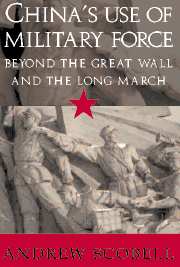
-
Select format
-
- Publisher:
- Cambridge University Press
- Publication date:
- July 2009
- September 2003
- ISBN:
- 9780511510502
- 9780521819794
- 9780521525855
- Dimensions:
- (228 x 152 mm)
- Weight & Pages:
- 0.566kg, 316 Pages
- Dimensions:
- (228 x 152 mm)
- Weight & Pages:
- 0.436kg, 318 Pages
You may already have access via personal or institutional login- Series:
- Cambridge Modern China Series
Book description
In this 2003 study of China's militarism, Andrew Scobell examines the use of military force abroad - as in Korea (1950), Vietnam (1979), and the Taiwan Strait (1995–6) - and domestically, as during the Cultural Revolution of the late 1960s and in the 1989 military crackdown in Tiananmen Square. Debunking the view that China has become increasingly belligerent in recent years because of the growing influence of soldiers, Scobell concludes that China's strategic culture has remained unchanged for decades. Nevertheless, the author uncovers the existence of a 'Cult of Defense' in Chinese strategic culture. The author warns that this 'Cult of Defense' disposes Chinese leaders to rationalize all military deployment as defensive, while changes in the People's Liberation Army's doctrine and capabilities over the past two decades suggest that China's twenty-first century leaders may use military force more readily than their predecessors.
Reviews
'He has carefully selected historical cases to support his theoretical point, and his narrative is not cluttered with political science jargon and terminologies. … he skilfully and effectively adduces historical facts to buttress his theoretical framework. His examination and explanation of China's application of force is thought-provoking and highly revealing.'
Source: China Information
Contents
Metrics
Altmetric attention score
Full text views
Full text views help Loading metrics...
Loading metrics...
* Views captured on Cambridge Core between #date#. This data will be updated every 24 hours.
Usage data cannot currently be displayed.
Accessibility standard: Unknown
Why this information is here
This section outlines the accessibility features of this content - including support for screen readers, full keyboard navigation and high-contrast display options. This may not be relevant for you.
Accessibility Information
Accessibility compliance for the PDF of this book is currently unknown and may be updated in the future.


